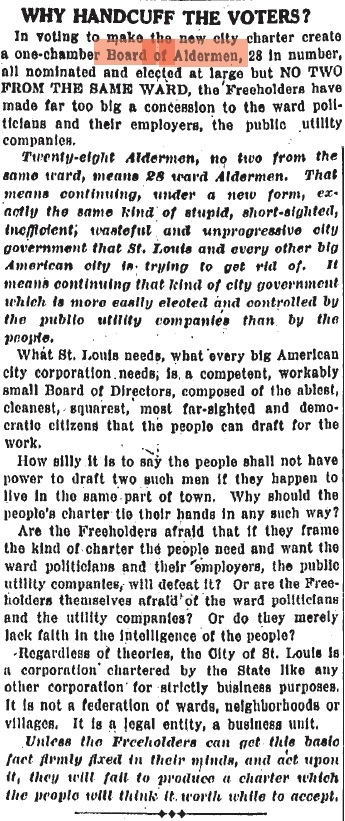by Michael R. Allen
Ahead of the adoption of a new city charter on June 30, 1914, the St. Louis Post-Dispatch editorialized against the new Board of Aldermen proposed in the charter by the Board of Freeholders. the following editorial appeared in the newspaper’s January 17, 1914 edition. The newspaper’s words were not heeded, and the new city charter went into effect with a new Board of Aldermen composed of 28 members representing individual wards. Until 1943, when voters amended the charter to mandate ward elections, these aldermen were elected by the voters at large. The Board of Aldermen replaced the bicameral legislature consisting of the House of Delegates and the City Council.
When the new city charter was drafted, the authors offered the Board of Aldermen as a legislature that would break the city from the inefficient and corrupt ways of the House of Delegates. The Post-Dispatch wisely predicted that the Board of Aldermen might be different only by degree. Ninety-eight years later, voters head to the polls to consider Proposition R, which would reduce the Board of Aldermen to 14 members. The words of the Post-Dispatch in 1914 are almost as fresh today as they were then.
Note that the Post‘s main complaint against the structure of the proposed Board is the ward system itself. The newspaper supported an at-large legislative body, which the city had before in the 1914 charter in the form of the City Council. The City Council often was at odds with the House of Delegates over progressive reforms, and was widely viewed as less dominated by corruption and political machines. There is no proposal to return to an at-large chamber, but reformers hope that a reduced Board will make aldermen accountable to larger constituencies with more diverse interests — and thus more likely to focus on wide public policy goals than on the city services needs of small communities. Yet reduction alone will not change the statutory powers of aldermen after 2023, when the reduction would go into effect.


One reply on ““Why Handcuff the Voters?””
Cities are corporations are people, my friend!